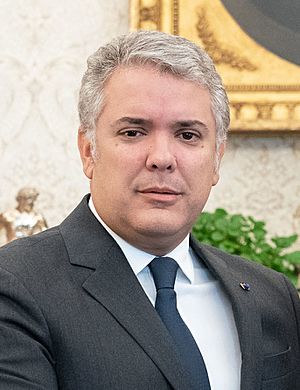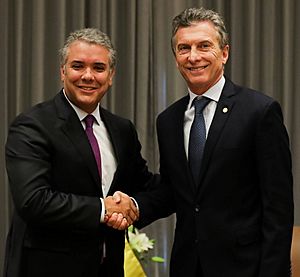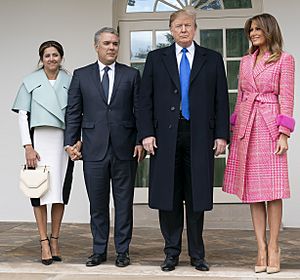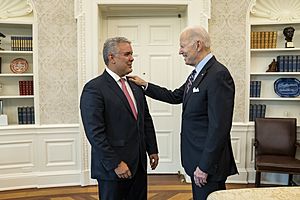Iván Duque facts for kids
Quick facts for kids
Iván Duque
|
|
|---|---|

Duque in 2020
|
|
| 34th President of Colombia | |
| In office 7 August 2018 – 7 August 2022 |
|
| Vice President | Marta Lucía Ramírez |
| Preceded by | Juan Manuel Santos |
| Succeeded by | Gustavo Petro |
| President pro tempore of PROSUR | |
| In office 12 December 2020 – 27 January 2022 |
|
| Preceded by | Sebastián Piñera |
| Succeeded by | Mario Abdo Benítez |
| Senator of Colombia | |
| In office 20 July 2014 – 10 April 2018 |
|
| Personal details | |
| Born |
Iván Duque Márquez
1 August 1976 Bogotá, Colombia |
| Political party | Democratic Center |
| Spouse |
María Juliana Ruiz
(m. 2003) |
| Children | 3 |
| Alma mater | Sergio Arboleda University American University Georgetown University |
| Signature |  |
Iván Duque Márquez (born August 1, 1976) is a Colombian lawyer and politician who was the president of Colombia from 2018 to 2022. He was a member of the Democratic Centre Party.
Duque was not very well known before the election. He was supported by former president Álvaro Uribe. One of his main campaign ideas was to change the peace agreement made with the FARC, a large guerrilla group. A guerrilla group is a non-official army that fights against the government.
During his presidency, Duque did not cancel the peace agreement. He also managed the Venezuelan refugee crisis, allowing about 1.7 million people from Venezuela to find safety in Colombia. His time in office also included the COVID-19 pandemic in Colombia. There were large protests in 2019 and 2021 against his government's plans. When he left office, his approval rating was around 30%.
Contents
Early Life and Education
Iván Duque Márquez was born in Bogotá, Colombia, into a powerful political family. His father, Iván Duque Escobar, was a governor, a government minister, and worked for the United Nations. His mother, Juliana Márquez Tono, is a political scientist.
Duque earned a law degree from Sergio Arboleda University in Bogotá in 2000. He later earned two master's degrees in the United States. One was in international economic law from American University, and the other was in public policy from Georgetown University.
Early Career
Duque started his career in 1999 as a consultant for a development bank. He later worked as an advisor for Colombia's Ministry of Finance.
From 2001 to 2013, he worked at the Inter-American Development Bank (IDB) in Washington, D.C. The IDB helps fund projects in Latin America and the Caribbean. He also worked as an advisor for former President Álvaro Uribe Vélez and for the United Nations.
Path to the Presidency
Becoming a Senator
In 2014, Duque returned to Colombia to run for the Senate. He joined the new Democratic Center Party, which was led by former president Uribe. The party was against the peace talks that President Juan Manuel Santos was having with the FARC.
Duque was elected as a senator. During his time in the Senate, he helped create four new laws. These laws increased time off for new mothers, put life-saving defibrillators in public places, and supported creative industries like art and film.
2018 Presidential Election
In 2017, the Democratic Center Party chose Duque as its candidate for president. He won the primary election for a group of center-right parties in March 2018. He chose Marta Lucía Ramírez to be his vice-presidential running mate.
In the first round of the presidential election, Duque received the most votes. In the second round on June 17, 2018, he won with 54% of the vote, defeating Gustavo Petro.
Presidency (2018–2022)

Duque became president on August 7, 2018. His government focused on improving the economy and strengthening the rule of law. His term ended on August 7, 2022, and Gustavo Petro became the next president.
Domestic Policies
Peace Agreement and Security
Even though he had opposed the peace deal with the FARC, Duque did not end it. However, his government tried to change parts of it. It also stopped peace talks with another guerrilla group, the ELN.
During his presidency, violence in some parts of Colombia increased. There were many attacks that killed social leaders and former FARC fighters who had agreed to the peace deal.
Economy and Environment
Duque's government created a plan to increase gold and copper mining and oil drilling. This plan was criticized by environmental groups. They worried it would harm nature and use up Colombia's natural resources.
COVID-19 Pandemic
During the COVID-19 pandemic, Duque hosted a daily TV show called "Prevention and Action" to inform the public. At first, the show was popular. But as it continued, many people began to criticize it, especially when large protests started in 2021. The pandemic also caused Colombia's economy to shrink by 6.8% in 2020, the largest drop in the country's history.
Protests Against the Government
2019 Protests
Starting in November 2019, hundreds of thousands of Colombians protested. They were unhappy with the government's plans for the economy, pensions, and taxes. They also wanted to show support for the peace process. The government sent the army to major cities to keep order.
2021 Protests
In April 2021, new protests began. This time, people were angry about a proposed tax increase during the pandemic. The protests grew to include other issues, like poverty and police violence.
Venezuelan Refugee Crisis
Duque's government continued to welcome people fleeing from the crisis in neighboring Venezuela. Colombia provided aid, schooling, and healthcare to many refugees. In 2021, his government gave temporary legal status to nearly 1.7 million Venezuelan migrants. This decision was praised by leaders and organizations around the world.
Foreign Policy


Duque had a close relationship with the United States under both President Donald Trump and President Joe Biden. He strongly opposed the government of Nicolás Maduro in Venezuela.
He also spoke out against the 2022 Russian invasion of Ukraine, calling it a violation of international law.
Life After the Presidency
After his presidency ended, Duque became a "distinguished fellow" at the Woodrow Wilson International Center for Scholars, a research center in Washington, D.C. He has also become an amateur DJ.
He has written several books on topics like economics, politics, and culture. He has also written for major newspapers in Colombia and Spain.
Personal Life
Duque is married to María Juliana Ruiz Sandoval. They have three children: Luciana, Matías, and Eloísa.
Images for kids
-
Duque with Israeli President Isaac Herzog in Jerusalem, 8 November 2021
-
Coat of arms of Duque as Knight of the Collar of the Order of Isabella the Catholic.
Honours
National honours
 Grand Collar of the Order of Boyacá.
Grand Collar of the Order of Boyacá. Collar of the Order of San Carlos.
Collar of the Order of San Carlos. Grand Cross Extraordinary of the National Order of Merit.
Grand Cross Extraordinary of the National Order of Merit.- Order of Merit Colonel Guillermo Fergusson.
Foreign honours
 Brazil
Brazil
 Grand Collar of the Order of the Southern Cross (2021).
Grand Collar of the Order of the Southern Cross (2021).
 Dominican Republic
Dominican Republic
 Peru
Peru
 Portugal
Portugal
 Grand Collar of the Order of Prince Henry (2022).
Grand Collar of the Order of Prince Henry (2022).
 Spain
Spain
 Collar of the Order of Isabella the Catholic (2021).
Collar of the Order of Isabella the Catholic (2021).
 South Korea
South Korea
See also
 In Spanish: Iván Duque para niños
In Spanish: Iván Duque para niños



